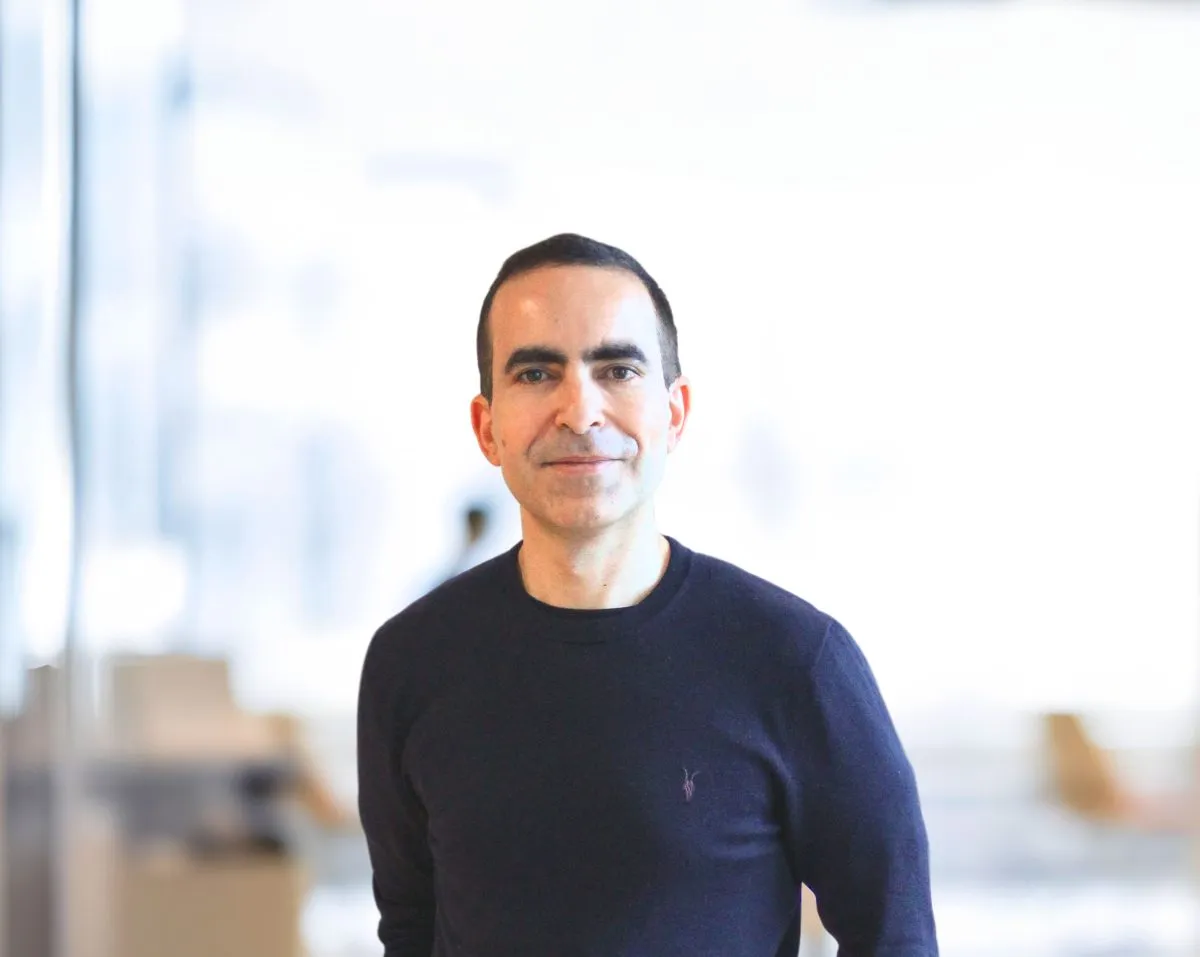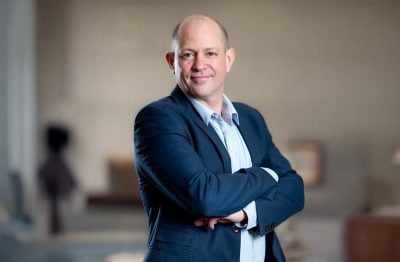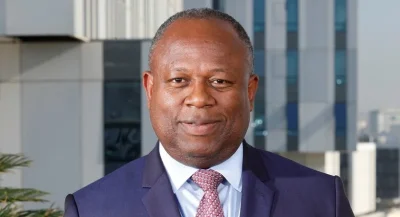When Karim Beguir and Zohra Slim co-founded artificial intelligence pioneer InstaDeep a decade ago, the idea of an Africa-founded AI business with applications in fields as diverse as medical science, shipping and circuit board programming wasn’t even on their radar.
All that the Tunisian-born founders knew was that they hoped to use their understanding of software and mathematics to affect meaningful change on the continent of their birth.
“The reason to start in Africa, in Tunisia – and the project was going to be technology in general, we were not clear about the exact path – was it had to have a positive impact on the communities. The idea was always to empower local talent, and create a business that’s lean, digital and international from day one,” Beguir, the InstaDeep co-founder and CEO, tells African Business from the firm’s offices in London’s Paddington.
Naturally experimental and impatient to make an impact, the startup flitted between projects, toying with website development and chasing the white whales of virtual and augmented reality. Investor interest was minimal, budgets were stretched to the max, and the two founders, says Beguir, didn’t take a salary “for years”. It took Beguir’s in-depth reading of a detailed AI research paper, laden with technical details and complex mathematics, for the future outline of the firm to emerge.
“Initially I thought I would not understand what I was reading. But it turned out that actually, I could follow what was going on. I realised that I knew these things. These things were not science fiction for me. I realised I had the exact background – applied mathematics at École Polytechnique in France and then in the US at the Courant Institute of Mathematical Sciences [at New York University]. My co-founder’s forte is the technical, software side of things; mine is also technical, applied math, AI, and neural nets – so we already had a team. That was the lightbulb moment – InstaDeep was going to be a full-force AI company that would prove everybody wrong.”
Today, ten years on from the company’s founding, Beguir’s initial feeling that the partners had a unique grasp of the challenges and opportunities of AI has been vindicated in spectacular fashion. In that time, InstaDeep has leapt from being a small Tunisian startup to a global firm with around 300 staff and offices across Africa – including Cape Town, Lagos, Kigali and Tunis – as well as bases in the world’s major financial hubs.
In 2018 – the year which changed everything for the firm – InstaDeep opened its London office and raised its first $8m Series A funding round with investors AfricInvest. They haven’t looked back since. Alongside its physical expansion, the range of its technologies has developed at a similarly startling rate. Today it has multiple flagship products. DeepPack is an AI application allowing shippers to pack containers with maximum efficiency to achieve volume and cost savings; while DeepPCB uses AI to design complex printed circuit boards in less than 24 hours. And then there’s DeepChain – InstaDeep’s programme which allows medical researchers to explore protein sequences in minutes with AI language models trained on billions of amino acids.
It was surely the promise of the latter – as well as the firm’s potential “to discover, design and develop next-generation immunotherapies at scale by leveraging artificial intelligence and machine learning technologies” – that led German biotech firm BioNTech (creators of the hugely successful Pfizer-BioNTech Covid-19 vaccine) to complete a cash-and-shares takeover of InstaDeep in January 2023, building on previous investment and close collaboration dating back years. The total consideration to acquire the remaining InstaDeep shares, excluding the shares already owned by BioNTech, amounted to approximately €500m in cash, BioNTech shares, and performance-based future milestone payments. From humble beginnings, InstaDeep had captured the zeitgeist.
Insta-success
Amid the palpable global excitement around AI – the multi-billion dollar deals, the breathless news coverage and social media hype, the furrowed brows of regulators and the dystopian talk of AI’s humanity-destroying potential – it is easy to lose track of the unique value of some of the new technologies. In contrast to the high-minded utopianism of much AI, InstaDeep is keen to assert its basic usefulness to business, highlighting its offering of “AI systems to tackle the most complex challenges across a range of industries and sectors”.
And while complex concepts like machine learning and computing accelerated by graphics processing units (GPUs) also pepper the company’s promotional material, AI first and foremost offers a chance to bring fresh solutions to familiar real-world problems, says Beguir.
“AI today is like electricity. It can be used for multiple applications. Behind the different use cases that can seem very separate from each other lie the same technology platforms, the same innovation… the best way to understand what InstaDeep does is what I called “productised innovation”. We’re not just a great research team. We have the ability to translate this innovation into high-impact products. I’m an AI researcher, but I’m passionate about impact, the ability to move the needle.”
With its generations-old challenges in agriculture, trade, healthcare and technology, nowhere are innovative solutions to societal problems more in-demand than on the African continent. It is here that Beguir argues that companies like InstaDeep, with their local knowledge and appreciation of society’s challenges, have the ability to carve out niches which often elude the giants of the sector.
“It’s possible for AI startups to grow and thrive in Africa. The key thing is to cater to local problems affecting the community. The large players like Open AI and Microsoft are not necessarily going to be the best people to solve a problem affecting a specific community in Africa… If you are from that community and you understand the problem and there is enough critical scale, which very often there is, you can actually solve the problem and build up a successful company grounded locally – you can then unlock a thriving ecosystem. Success breeds success.”
It was this potential to delve into unique AI use cases that first led the firm to expand across the continent of its foundation.
“We were part of this African AI scene, meeting great people, intellectually curious, fantastically gifted. We met fascinating people, notably Arnu Pretorius [now InstaDeep’s head of AI research in Africa], who was at the time the first African AI researcher to have been accepted at major AI conferences with a paper on Africa. “Meeting Arnu in Stellenbosch in 2018 was the moment where I thought, this is amazing, nobody’s built a pan-African AI startup and AI team, but we’re going to do it. And the story in Lagos is pretty similar – we have very talented people with an incredible willingness to learn and go beyond what’s possible.”
Encouraging teams to collaborate, both across the continent and beyond, throws up projects of genuine utility, if not necessarily always commercial application, Beguir says. In recent months, the Lagos, Kigali and Cape Town offices collaborated on building a system to detect locust breeding grounds by using satellite imagery from organisations including NASA and the European Space Agency. The teams claim that they can predict the breeding grounds of locusts with more than 80% accuracy up to 30 days out, a potentially priceless weapon in the fight against crop decimation and hunger in Africa.
“What’s exciting about us is that most of the projects we do, whether research or paid projects with partners, always involve at least two offices. There is this culture of collaboration – no matter where each office is located in the world, these teams and offices have access to the most exciting projects. That’s very empowering, not only for our young talent in Africa.”
The war for talent
Yet in an industry likely to be dominated by capital-intensive Silicon Valley giants offering exceptional salaries and lifestyle perks, can African-founded firms like InstaDeep win the war for talent and retain the continent’s most gifted AI developers? Beguir says that the firm has introduced both financial and work-based incentives in a bid to hold onto the continent’s best and brightest.
“If you are very ambitious, you join a startup in Africa that’s changing the world. And guess what? Even financially, you might be better off. I mentioned the sharing of the hot projects across the company without bias. Another thing which is critical is that we had this culture where salaries relate to the cost of living in each country, but not stock options. All teams, no matter where, would be eligible for stock options purely based on their merit. People have access to the same projects and same rewards. And I’m very proud of the fact that in Tunisia, Lagos, Cape Town, we created a good number of millionaires with this approach, which proved that you can be successful while staying back home and doing disruptive work that moves the needle.”
That has even led staff from the firm’s European and US offices to pursue opportunities in the firm’s African offices. And in a recent documentary, Cape to Carthage, the firm highlighted the work of what it called the “first pan-African AI research team”.
In truth though, Africa’s ability to attract the best tech talent goes beyond the actions of any one company. Building ecosystems is also the responsibility of African policymakers, Beguir says.
“The issue is more about the quality of the projects. I’d like to see many more high-quality startup projects up to international standards, up to Y-Combinator standards. There is an appetite from both local and international investors to back African startups – we just need to improve and raise the bar in terms of quality.”
Beguir lauds Tunisia’s Startup Act, which he says allowed InstaDeep to hire more staff by exempting the firm from employer taxes for five years. But he says the country and others in Africa can still do much more to attract external talent capable of developing local expertise.
“One critical thing that I’m not seeing enough of, and I would love to see more of, is for African governments to understand that if you have elite machine learning and AI or tech experts coming to you and wanting to reside in your country, that’s great. For example, Tunisia would certainly benefit if we had way more work visas authorised for people with ten years or more experience to set up shop, because many Tunisians want to learn but there is not enough expertise locally. A notable development was President Kagame in Rwanda announcing that any young African that comes to Kigali by plane is authorised to work. That’s the kind of ground-breaking initiative that can favour the development of the AI and tech sectors… to enable young thriving startups to lead that revolution.”
Regulatory give-and-take
Yet the first challenge is persuading African governments that the immense potential benefits of a strong AI industry outweigh the challenges, from in-built data biases to AI’s capacity for job erosion. Beguir, who participated in the 2023 AI Safety Summit at the UK’s Bletchley Park, is keenly aware of the divided views among global policymakers on the industry in which he has made his fortune.
“The complex question is: how do you prevent the most negative outcomes of AI while promoting the positive ones? I’ll give you a concrete example – open sourcing. There is debate right now over whether we should open-source fully; or should we do the opposite and regulate and prevent open-sourcing? From my personal perspective, I do believe there can be compromise. Open-sourcing is amazing – it’s what allowed InstaDeep, especially in the early days, to grow exponentially in capabilities by leveraging the work of others. Today, InstaDeep open-sources a massive amount of innovative research, so we’re contributors as well and this is very beneficial for economic growth.
“At the same time, when we’re looking at models that are trained with more computing than everything that’s been done in history, it’s important that we have a positive dialogue with regulators and that there is some control taking place, because at the frontier we are seeing the emergence of capabilities that were previously science fiction… A certain level of smart oversight is needed for preserving good outcomes, but we do definitely need to have this open community to allow, notably in Africa, many more projects to be successful like InstaDeep has been.”
Ultimately, Beguir passionately believes that Africa has to earn its seat at the top table by enabling excellence at home. Only when African AI is capable of creating its own datasets, or governments are able to unleash the power of their countries’ own AI enterprises, can the continent expect to take its rightful place in global conversations on data biases and regulation, he argues.
“What’s at stake is, can we create local champions that become international champions and then are part of the global conversation and innovation in AI? If we have our own AI champions or startups, then they will create more data and the ownership of that data will be local.”
Enter BioNTech
As the first decade of InstaDeep’s journey draws to a close, the firm’s position as an African trailblazer at the heart of these critical conversations looks assured. But with BioNTech’s big-money takeover complete, InstaDeep’s future as a subsidiary means the next decade is likely to look substantially different.
The firm is no stranger to working with companies of international renown – in 2022, it extended a long and fruitful collaboration with US hardware and software giant Nvidia by announcing that it will use the Nvidia Cambridge-1 supercomputer to train AI language models using genomics data – but the BioNTech takeover offers an even deeper level of corporate intimacy. Will the firm be able to retain its African focus, individual character and autonomy? Beguir, perhaps unsurprisingly, thinks so. Since the takeover, the company has opened its office in Kigali, Rwanda, where BioNTech has its own manufacturing facility, and InstaDeep will continue to deliver solutions in areas as diverse as technology, transport & logistics, industrial, and financial service. If anything, the firm is planning to extend its horizons, Beguir says.
“We’re very excited to be part of BioNTech Group, and because it’s been such a great partner for five years and we’ve been working hand-in-hand for such a long time, the acquisition was not a big change. We are operationally independent. We obviously support our BioNTech colleagues on the very exciting work they do at the cutting edge of biology. And we also have our ability to engage with external partners in other fields, from optimising electrical grid networks to train networks and working on hardware design and many other exciting projects.
“What’s exciting is that we have the chance to work on projects that can really change the world.”
And, Beguir says, the takeover also sends another message to young African AI entrepreneurs – with the right ideas and technical knowhow, international players will open their chequebooks.
“My message to young talent in Africa is: AI is happening. We are still at the beginning so do not be afraid to learn more about what’s going on in AI. It’s probably the best return on investment in terms of your learning and education that you can do.”

 Sign in with Google
Sign in with Google 



